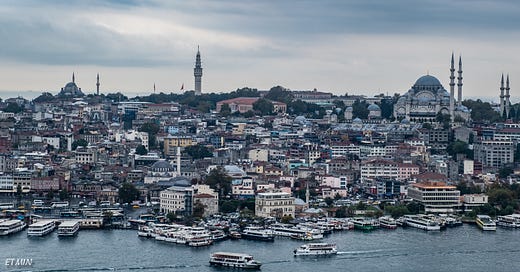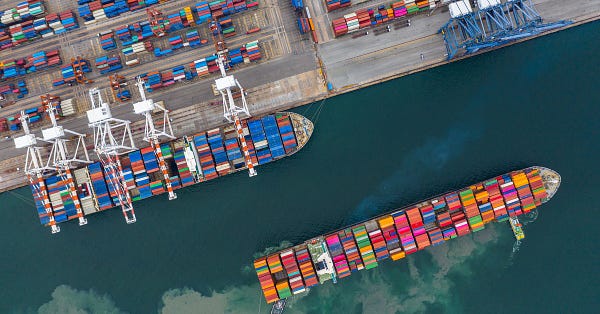Emerging Markets Daily - May 3
Turkey Markets on Edge, Commodities 'Supercycle', 'Welcome to the New Casablancas', Korea Platforms Eye SE Asia, Colombia Withdraws Tax After Protests, + 'Globalization in a Needle' and more
The Top 5 Emerging Market Stories from Global Media - May 3
Turkey Stocks On Edge as Portfolio Outflows Rise
bne Intellinews (Istanbul Blog)
“Overall portfolio outflows from Turkey— including equities, domestic bonds, eurobonds and swaps—amounted to $1.54bn in the week ending April 22, following slight inflows recorded in the previous two weeks.”
“The country has found itself unsettled by another period of economic disquiet, with renewed trepidation as to what could be around the corner, since the shock firing of market friendly central bank governor Naci Agbal by presidential decree on March 19.”
“On the Borsa Istanbul and lira markets, there remains little liquidity, making Turkish assets vulnerable to shocks. Why the local stock market is not collapsing remains a mystery. The foreign investors are selling. And company owners are siphoning the market with initial public offerings (IPO) and rights issues.”
“Yet outbreaks of turbulence on the Istanbul stock exchange—as mentioned by bne IntelliNews on numerous occasions in the past couple of years—are forestalled by an ‘invisible hand’ that keeps a grip on some of the stocks that make up the biggest weights in the benchmark indices.” Akin Nazli reports.
Wide-Ranging Commodities Boom Spurs “Supercycle” Talk
Financial Times
“A broad and powerful rally in commodities markets has gathered steam in recent weeks, fuelling expectations among some traders and analysts that a ‘supercycle’ has kicked off as big global economies rev up in tandem.”
“Strong demand from China, a boom in government spending on post-pandemic recovery programmes and bets on the ‘greening’ of the world economy have lifted the price of many important raw materials.”
“Iron ore, the key ingredient needed to make steel, palladium, used by carmakers to limit harmful emissions, and timber all hit record highs in the past week. Key agricultural commodities including grains, oilseeds, sugar and dairy have also jumped, with corn prices above $7 a bushel for the first time in eight years.”
“‘I don’t know if we have seen anything like this before,’ said Ulf Larsson, chief executive of Swedish pulp and timber company SCA, which announced a 66 per cent increase in first-quarter net profit on Friday. ‘We are in some kind some of perfect storm.’ At the same time copper, the world’s most important industrial metal, traded above $10,000 for the first time since 2011, while soyabeans hit an eight-year high…”
“Predictions among some traders, analysts and executives for a new supercycle — a prolonged period of high prices as demand outstrips supply — have lured investors. Saad Rahim, chief economist at Trafigura, one of the world’s biggest independent commodity traders, said the vast stimulus spending programme launched by the US has helped build expectations that demand for commodities in the world’s biggest economy will rise.” Neil Hume, David Sheppard, Emiko Terazano and Henry Sanderson report.
Welcome to the New Casablancas: The World Cities That Stayed Open
Wall Street Journal
“International executives are making their way to locales where business is being conducted in person.”
“Oliver J. Christof used to spend some 300 days a year traveling the world, drumming up business for his family’s industrial-services company in Austria. In October, when Europe entered a new wave of lockdowns, the family relocated to Dubai, one of the few cities open in a world largely closed.”
“People now come to see Mr. Christof. This year, some four-fifths of the company’s clients and partners have shown up in Dubai, he said, and most extend their visit. The city is one of the few in the world where restaurants, shops and corporate offices are all open for business.”
“‘Most of them have found that many of their own friends and colleagues and partners already are in Dubai, too,’ said Mr. Christof, 40 years old.”
“In a pandemic, normal is the big attraction. Executives who can afford it are finding their way to the few Casablancas open to conducing international business in person. Dubai, which has no quarantine requirements and few entry restrictions, is one.”
“During a two-month visit to Dubai this year, Malaysian startup founder Terrence Hooi, 35, mingled with venture capitalists, bankers and other entrepreneurs from around the world. One hot spot was the monthly party for startups at a Mexican restaurant serving pitchers of frozen margaritas.”
“In-person is still one of the best methods of establishing a rapport: If I haven’t met you, you probably wouldn’t write me a check,” said Mr. Hooi, who secured in Dubai $200,000 in funding for his investment app, Singular.
“Of course you can do meetings by Zoom, but it’s not the same, especially if you enter new a market,” said Vygaudas Usackas, a former foreign minister of Lithuania who traveled to Ukraine’s capital city Kyiv in March for a board meeting of Avia Solutions Group, a Cyprus-based aviation-services company. Kyiv had served for months as a business oasis, until a surge of new cases prompted a late March lockdown. Mexico is another such destination.” Yaroslav Trofimov reports. (Yaroslav is a friend of Emerging World. He also wrote one of the best books on the Middle East, The Siege of Mecca.)
Korean Tech Platforms Make a Play for Southeast Asia Market
Korea Times
“A number of domestic platform operators are gathering in Southeast Asia to compete against each other in the belief that the region is the bridgehead to a global market.”
”The average income per capita of Southeast Asian countries is about $4,400, but the region's market has great potential for growth as the size of the middle class is expected to increase to 200 million by 2025”
”In Jakarta, the capital Indonesia, annual income is now over $10,000 having soared recently and making it an attractive investment area for Korean firms.”
”Platform operators Grab and Gojek that started in the local markets of Singapore and Indonesia, respectively, have already become eponymous ‘Super-Apps’ in Southeast Asia based on massive populations with relatively equally high purchasing power.”
”However, Korean firms ― riding the wave of Korean culture' increasing popularity there ― are seeking opportunities in ‘blue oceans’ that have not yet been cultivated.” Kim Jae-heun reports.Colombia’s President Withdraws Tax Reform after Violent Protests
Reuters
“Colombian President Ivan Duque said on Sunday he would withdraw a proposed tax reform after deadly protests and widespread lawmaker opposition, though he insisted a reform is still necessary to ensure fiscal stability.”
“Protests - have led to multiple deaths around the country since they began on Wednesday - continued on Sunday in some cities, despite the announcement.”
“Duque said on Friday the law would be revised to remove some of its most controversial points - including the leveling of sales tax on utilities and some food - but the government had previously insisted it could not be withdrawn.” Julia Symmes Cobb reports
What We’re Also Reading…
Indonesia Presses on with Capital Relocation Plan Despite Pandemic
Nikkei Asia
“Indonesia's $32 billion plan to move its capital city from Jakarta to Borneo is triggering fresh debate over issues ranging from the design of a new palace to the chances of attracting global funding amid the pandemic.”
“Local officials recently said construction of the new palace is planned to start soon, with 2024 targeted for completion of the structure and other government offices and public facilities in the new capital. This would be before Widodo's second and final term expires the same year.”
“Announced in 2019, Widodo wants Indonesia's administrative capital to be moved to East Kalimantan, citing Jakarta's overcrowding, traffic jams and pollution -- as well as the need for a growth engine in the eastern half of Indonesia. Most government offices will relocate there, as well as parliament, military and police headquarters. Jakarta will remain as the country's financial and commercial hub.” Erwida Maulia reports
Baltic Freight Index Hits Highest Mark in More than a Decade
Hellenic Shipping News
“The Baltic Exchange’s main sea freight index, which tracks rates for ships ferrying dry bulk commodities, climbed to its highest since mid-2010 on Thursday as demand improved for all vessel segments.”
“The Baltic dry index, which tracks rates for capesize, panamax and supramax vessels gained 50 points, or 1.7%, to 3,007, extending its winning streak to 12 sessions. The main index was up to its highest level since mid-June 2010.”
“The capesize index was up 94 points, or 2%, at 4,774, a peak since September 2019. Average daily earnings for capesizes, which typically transport 150,000-tonne cargoes of coal and steel-making ingredient iron ore, added $773 at $39,589.”
“Chinese steel rebar and hot-rolled coils futures rose on Thursday, after Beijing announced adjustments on tax and tariffs for some ferrous products to support domestic crude steel production cuts.” HSN reports.
Mozambique Inaction Fuels Tanzania’s Gas Ambitions
Bloomberg
“Total’s decision this week to suspend its $20 billion project in northern Mozambique indefinitely has effectively put an anticipated $120 billion gas boom on hold.”
“It comes as neighboring Tanzania finds renewed momentum in the race to develop East Africa’s gas resources before a global campaign to end the use of fossil fuels renders them valueless.”
“Tanzania’s new President Samia Suluhu Hassan…has breathed fresh energy into her nation's projects. She’s quickly resuming negotiations with the companies to try and conclude an agreement within six months. In her maiden speech, Hassan stressed the need for the nation to work with investors and get projects up and running.” Paul Burkhardt and Antony Sguazzin report
Note to Readers/Fellow Travelers:
Our humble caravan of Emerging World fellow travelers continues to grow. It’s an honor to have you aboard. For those of you who are new, you can always reach me/us at eworldairmail@gmail.com. We love book or film suggestions, interesting photos, vintage posters, tea or other beverage recommendations or anything else Emerging World-ish that caught your eye.
The wonderful Istanbul photo from above comes from the remarkable photography of Shahriar Etminani, also a fellow traveler.
As always, you will receive a daily round-up of the “Top 5” emerging markets stories shaping our world. We curate the stories from a wide range of global sources. Yes, you will see the FT and Bloomberg, etc but also the South China Morning Post, the Tashkent Times, the Times of India, and interesting blogs, like the one that led our round-up today.
You will also receive occasional interviews and the weekly column by your humble correspondent. Speaking of which…
Tweet of the Day: Globalization in a Needle
This one is a bit self-serving, but I’ve been very gratified to see the response to my column, Globalization in a Needle, which has now knocked out Why Travel Matters as the most-read piece on our site. Fellow traveler Karim Sadjadpour’s tweet on the column sparked a whole range of conversations.
ICYMI Weekend Edition - By the Numbers and Notable Quotable from our Sunday edition
Big Tech Getting Bigger - 1Q Results Soar to New Heights
$322 Billion - The combined first quarter revenue of Alphabet, Amazon, Apple, Facebook, and Microsoft. This is roughly equivalent to the annual GDP of Egypt, Bangladesh, or Chile.
$75 Billion - After tax first quarter earnings of the five tech companies noted above. This is roughly equivalent to the GDP of Oman, Panama, or Ghana.
Notable Quotable - Myanmar Poverty Rising
“The study we’ve done projects that half the population [of Myanmar] is going to be living in poverty by early next year,” said Kanni Wignaraja, the UNDP’s Asia-Pacific regional director. “That’s a doubling of the pre-pandemic levels of poor.” Source: Financial Times





